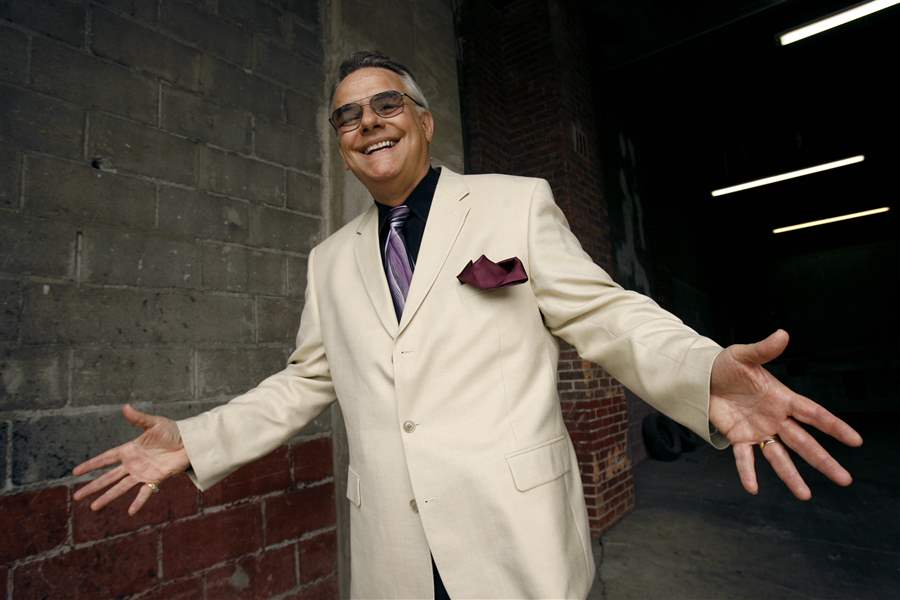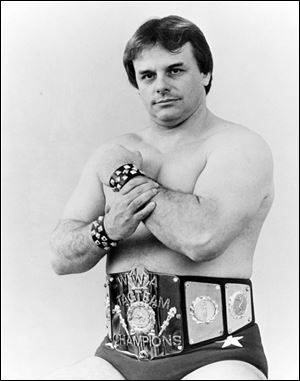
Ex-wrestler a showman first
7/19/2009
Jerry Jaffe, above, is better known to Toledoans as Dr. Jerry Graham, the name he adopted when he was a professional wrestler in the 1970s.
The Blade/Andy Morrison
Buy This Image

Jerry Jaffe, above, is better known to Toledoans as Dr. Jerry Graham, the name he adopted when he was a professional wrestler in the 1970s.
In Their Words is a weekly feature appearing Sundays in The Blade's sports section. Blade sports writer Zach Silka talked with Bedford High School graduate and Sylvania resident Jerry Jaffe, a former professional wrestler who gained fame as Dr. Jerry Graham in the 1970s.
Of all the stories to come out of the now demolished Toledo Sports Arena, Jerry Jaffe's might be the craziest.
In his mid-20s looking to break into professional wrestling, Jaffe took any match that was presented to him.
Even if it wasn't against a fellow human.
On this particular day, Jaffe took on a 700-pound, Coke-guzzling black bear with no wrestling training.
The match lasted about five minutes and left Jaffe with a host of scratches. He'd go behind the bear, which would reach back and throw the wrestler over its shoulder.
The winner? Of course the black bear, which rolled on top of Jaffe and the referee declared him the champion.
Two nights later, Jaffe wrestled the bear again at Cobo Hall in Detroit.

Dr. Jerry Graham as a professional wrestler in the 1970s.
But it turned out to be worth the physical punishment for Jaffe. He later took on the persona Dr. Jerry Graham, the wrestler who boasted of having four PhDs, eight master's degrees, 16 bachelor's degrees, and 19 associate's degrees.
Jaffe, 62, retired from wrestling in 1992 but still trains prospective members of the sport and works as a wrestling promoter.
"IN GRADE SCHOOL, I used to watch wrestling on television. Since I was a little kid, I always wanted to be a wrestler. As things turned out, I wrestled in school and then I went into the Army. When I came out of the Army, I had a job driving trucks, and the guy that managed the station was a professional wrestling promoter. It was just like fate, you know? What were the chances? He trained me, and that was the start of my career. It's what I always wanted to do. That's why I'm 62 years old and have never had male menopause. I never looked back and said I should have done this or that.
"When I was first starting out in wrestling, I wanted to be a wrestler so bad I would do things the other young guys wouldn't do. Twice I wrestled a bear. Although they had a muzzle on him, they didn't have anything on his claws. I was scratched from head to toe. I also used to carry the seven-foot boa constrictor back to the dressing room after appearing in the ring with it. If there was a dirty job nobody wanted to do, that was for me.
"SADLY, THE BEAR ended up killing somebody. Fortunately, it wasn't me, but it's still a sad thing. It's something I would never do again. If I had had a little more maturity, I probably wouldn't have done something so crazy. The trainer was in the ring with me the whole time I wrestled with him. Afterward he told me, 'If the bear wanted to kill you, there's nothing I could have done to stop him.'
"I loved the craft and the art [of wrestling]. I had a lot of good teachers that brought me along. It wasn't just all how to do the holds, but when to do the holds. "There's a certain psychology to a wrestling match. They say you can teach the craft, but you can't teach the art. So I learned the craft and then the art came by itself.
"THE SECRET TO being a wrestling promoter in the early years of TV in the '70s and '80s was to have a good television show in the town you want to be in. Wrestling was the first infomercial.
"Even back in the late '40s, what you would do is have a wrestling TV show and then that would be used to promote the live event. So I was fortunate enough to get on television in Toledo, thanks to John Robinson Block, who was influential in helping me get my first TV show in
Toledo on Cablevision.
"Wrestling as it evolved in the '90s, I kind of lost interest because it started being based on foul language and sexually explicit stuff. I'm no prude, but I just didn't think wrestling was the place for that.
"I just didn't think it was appropriate, but they're making a lot of money so I could be wrong. I just didn't want to be involved with that. I wanted people to be able to take their grandchildren to the matches and have a good time.
"RIGHT NOW I'm involved in small, independent wrestling promotions started here in Toledo and around the country. It's more like the way it used to be, and that's what I enjoy. We're going to have our first live show at Sommerset Hall on Aug. 30. Some of the guys in the show I've trained personally, so hopefully I can pass the sport on to the next generation."